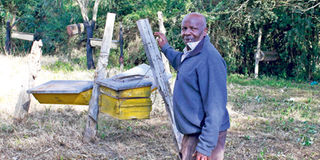Simple process that doubles our money from unrefined honey

Charles Gichuki, the treasurer of New Ruai Beekeepers Cooperative Society at Lamuria village in Laikipia County. JOSEPH KANYI |
What you need to know:
- The farmers own collectively the seven Langstroth hives, three traditional ones and 10 Top Bar hives. This is besides their individual ventures.
- In early 2011, a group of bee farmers came together and worked on a plan to re-open it, with the help of Bees Abroad Cooperative Limited based in Nanyuki.
- Water that is pumped from a nearby stream using a generator into plastic storage tanks placed at a raised level is then opened to flow through a pipe to the four solar panels where it is heated until it attains 100 degrees Celsius.
As we drive through the gate of New Ruai Beekeepers Cooperative Society Ltd on the border of Nyeri and Laikipia counties, we are welcomed by the sound of bees buzzing as they get in and out of their hives.
There are 20 hives in the compound that hosts the society, an indication of how the cooperative that brings together 50 farmers from the two counties takes the business seriously.
The farmers own collectively the seven Langstroth hives, three traditional ones and 10 Top Bar hives. This is besides their individual ventures.
We find Wilson Muthoa, a bee farmer in Lamuria village, delivering 10kg of raw honey from one of his hives.
He is served by Beatrice Wanjiku, the secretary, as Josephat Kiriungi, the chairman and Charles Gichuki the treasurer, label processed honey at a table. “I have 10 hives from which I get the honey. Each hive has the capacity to produce 8 to 12kg every four to five months. Once I harvest, I bring it to this factory for processing,” says Muthoa.
All the 50 bee farmers deliver their produce to the society for processing.
“Processed honey fetches more money than the raw one, enabling us to earn more income,” says Kiriungi, adding they buy a kilo of raw honey at Sh200 from farmers.
Kiriungi explains that the factory was started in 1978 by Mike Fernandes, a Canadian investor. He would buy the produce, process and sell abroad.
After he left in mid 80s, the plant was left in the hands of locals. However, processing stopped in 2001 due to mismanagement.
In early 2011, a group of bee farmers came together and worked on a plan to re-open it, with the help of Bees Abroad Cooperative Limited based in Nanyuki.
“We agreed that every farmer pays Sh500 registration fee and buys a minimum of four shares at Sh2,000. By December last year, we had 50 members.
We elected nine officials amongst ourselves to manage the factory,” explains Kiriungi, adding that they also got Sh150,000 funding from the East African Wildlife Society.
REFINE CRUDE HONEY
The farmers renovated the plant and set up the beehives, and further sought training to run the project.
Among the things they found intact at the plant are four storage tanks, solar panels, water tanks, a metallic warmer and four refining tanks.
These are the gadgets they are now using to refine the crude honey. The process starts with putting the honey into the metallic warmer.
Water that is pumped from a nearby stream using a generator into plastic storage tanks placed at a raised level is then opened to flow through a pipe to the four solar panels where it is heated until it attains 100 degrees Celsius.
It is, thereafter, pumped to the warmer, which has two tonnes capacity, where it heats the raw honey for three hours to melt.
The honey then flows through a connected pipe to the refining tanks where it is sieved, and it later flows to a storage tank, ready for packing.
They package the refined honey in 300 and 500g containers, sell each for Sh200 and Sh300.
“We normally remove the scum formed on the refined honey after it cools before packing. From the 500kg raw honey, we make a profit of Sh300,000 once we process,” says Kariungi of the products branded New Ruai Beekeepers Refined Honey, which they sell in retail outlets in Nyeri and Laikipia.
A farmer with a minimum of 20 hives earns Sh40,000 per harvest. That is, if he harvests at the same time.
Hemdan Ngari, a bee farmer in Lamuria, says through the organisation, they have found a ready market for their honey. “Before we would sell raw honey for Sh100 a kilo. We also benefit from dividends on profit made by the selling the processed honey. We get Sh2 per ever kilo delivered.”
The group is working on a plan to start the production of candles from wax.
Dr Grace Asiko, the Head of National Beekeeping Centre, advises bee farmers to locate hives where there is enough nectar for high yields.
“Farmers can plant shrubs and herbs which are very good sources of nectar and pollen. They should also watch out for pests like beetles, termites and bee badgers.”
Francis Kamau, the principal of Baraka Agricultural College says that during the dry season when there is little pollen, farmers can use supplementary feeds made from mixing sugar with water to prevent bees from flying for longer distances in search of nectar.
Honey, he adds, should be harvested when ready as it can cause serious allergies and even death when collected before time.
“Any farmer who wants to get the most income from their produce should process it. Processing helps to refine the product and make it appealing to consumers.” The farmers should also maintain high levels of hygiene during processing to avoid contamination.





